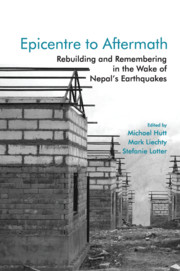5 - Disaster, Deceptions, Dislocations: Reflections from an Integrated Settlement Project in Nepal
Published online by Cambridge University Press: 08 July 2021
Summary
Introduction
Disasters, as well as post-disaster recovery and reconstruction, have sociopolitical implications (Hörhager 2015; Oliver-Smith 1996; Simpson 2013) and flawed or coercive reconstruction strategies can have negative economic, political, and sociocultural impacts (Oliver-Smith 1991). Based on a range of case studies, scholars have argued that for reconstruction and resettlement to be a success, understanding a local context and consulting with and enhancing the participation of an affected community prior to the design and implementation of a rehousing or settlement policy is extremely important (Oliver-Smith 1991; Razani 1984). International frameworks such as the Hyogo Framework for Action 2005–2015 (UNISDR 2005), the Sendai Framework for Disaster Risk Reduction 2015–2030 (UNISDR 2015), and the Sustainable Development Goals (SDGs) 2016–2030 (UN 2016) have also recognized the importance of the involvement, participation, and consultation of affected people and communities in the planning and implementation of policies and strategies for disaster risk reduction and response. This is because it helps not only to increase a sense of ownership of reconstruction, but also to enhance legitimacy and accountability. Reconstruction and resettlement plans and designs that are uniform and imposed from outside, without any consultation or consideration of local and indigenous social systems and cultural contexts, can have adverse impacts on disaster-affected people and communities (Oliver-Smith 1991: 16) and their social articulations (Duyne Barenstein 2006), identity, and traditional lives (Oliver-Smith 1991).
Similarly, providing inadequate space for culturally important ritual practices and for personal privacy (Razani 1984), for sheds, animal pens, and other agricultural needs (Razani 1984; Oliver-Smith 1991) and locating reconstructed dwellings at an excessive distance from kin and neighbours (Razani 1984) also lead to dissatisfaction and the failure of a reconstruction project. Community-led reconstruction processes, based on the framework and principles of rights-based reconstruction, the participation of local people, and owner-driven reconstruction are intrinsic parts of building back better. Owner-driven reconstruction is also more cost-efficient, culturally appropriate, and sustainable as compared with other methods of housing reconstruction (Duyne Barenstein and Iyengar 2009).
- Type
- Chapter
- Information
- Epicentre to AftermathRebuilding and Remembering in the Wake of Nepal's Earthquakes, pp. 110 - 134Publisher: Cambridge University PressPrint publication year: 2021



